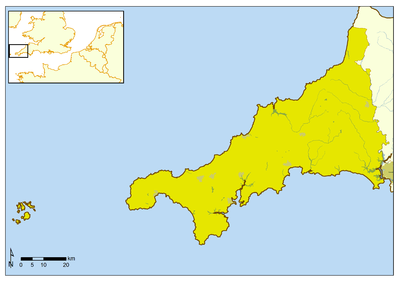Difference between revisions of "Study Cornwall and Scilly Isles"
(Created page with "__NOTITLE__ <span class="tochidden">Cornwall and Scilly Isles FLAG case study </span> ===<span style="color:#3a75c4; Font-size: 130%">'''<small>1. Introduction</small>'''</sp...") |
|||
| Line 6: | Line 6: | ||
Covering the largest coastal area in any of the English FLAGs the Cornwall and Scilly Isles FLAG is 3,563 square kilometres in size (See Figure 1), and as an industry fishing employs directly over 1000 people in the region. The Cornish fishing industry is one of the most varied in the UK with over fifty different species landed and fishing practices ranging from otter trawling to crab/lobster potting, to hand lining (FARNET, 2014). The large mixture of gear, size of boat, catch and vast distances within and between different ports is an important consideration in developing a more inclusive management approach in this region. Fishing is an important part of the Cornish economy and as in the other case studies it makes a substantial indirect contribution to the coastal economy through the draw of the fishing boats, fresh fish to buy and eat, and the picturesque fishing villages that are so central to the identity of the region and the tourism offer. | Covering the largest coastal area in any of the English FLAGs the Cornwall and Scilly Isles FLAG is 3,563 square kilometres in size (See Figure 1), and as an industry fishing employs directly over 1000 people in the region. The Cornish fishing industry is one of the most varied in the UK with over fifty different species landed and fishing practices ranging from otter trawling to crab/lobster potting, to hand lining (FARNET, 2014). The large mixture of gear, size of boat, catch and vast distances within and between different ports is an important consideration in developing a more inclusive management approach in this region. Fishing is an important part of the Cornish economy and as in the other case studies it makes a substantial indirect contribution to the coastal economy through the draw of the fishing boats, fresh fish to buy and eat, and the picturesque fishing villages that are so central to the identity of the region and the tourism offer. | ||
| + | |||
| + | {|style="margin:10px auto" | ||
| + | |[[Image:Fig cornwall.png|center|400px]] | ||
| + | :::: Figure 1. Cornwall and Scilly Isles FLAG, southwest England (Source: [http://www.vliz.be/nl/kaarten VLIZ], 2014) | ||
{{GIFS}} | {{GIFS}} | ||
Revision as of 09:37, 2 July 2014
Cornwall and Scilly Isles FLAG case study
1. Introduction
Covering the largest coastal area in any of the English FLAGs the Cornwall and Scilly Isles FLAG is 3,563 square kilometres in size (See Figure 1), and as an industry fishing employs directly over 1000 people in the region. The Cornish fishing industry is one of the most varied in the UK with over fifty different species landed and fishing practices ranging from otter trawling to crab/lobster potting, to hand lining (FARNET, 2014). The large mixture of gear, size of boat, catch and vast distances within and between different ports is an important consideration in developing a more inclusive management approach in this region. Fishing is an important part of the Cornish economy and as in the other case studies it makes a substantial indirect contribution to the coastal economy through the draw of the fishing boats, fresh fish to buy and eat, and the picturesque fishing villages that are so central to the identity of the region and the tourism offer.
|
